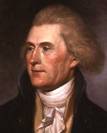 Thomas Jefferson
Thomas Jefferson The founders were declaring independence from Great Britain, of course. But they had to justify it not only to their fellow colonists, but to the rest of the world, including potential allies who would never interfere in a civil war.
The article begins,
The Declaration of Independence is perhaps the most masterfully written state paper of Western civilization. As Moses Coit Tyler noted almost a century ago, no assessment of it can be complete without taking into account its extraordinary merits as a work of political prose style. Although many scholars have recognized those merits, there are surprisingly few sustained studies of the stylistic artistry of the Declaration. This essay seeks to illuminate that artistry by probing the discourse microscopically--at the level of the sentence, phrase, word, and syllable. By approaching the Declaration in this way, we can shed light both on its literary qualities and on its rhetorical power as a work designed to convince a "candid world" that the American colonies were justified in seeking to establish themselves as an independent nation.
Although the preamble is the best known part of the Declaration today, it attracted considerably less attention in its own time. For most eighteenth-century readers, it was an unobjectionable statement of commonplace political principles. As Jefferson explained years later, the purpose of the Declaration was "not to find out new principles, or new arguments, never before thought of . . . but to place before mankind the common sense of the subject, in terms so plain and firm as to command their assent, and to justify ourselves in the independent stand we are compelled to take."
The article then goes on to explain how, based on these principles, the colonists were justified in changing their form of government:
Unlike the preamble, however, which most eighteenth-century readers could readily accept as self-evident, the indictment of the king required proof. In keeping with the rhetorical conventions Englishmen had followed for centuries when dethroning a "tyrannical" monarch, the Declaration contains a bill of particulars documenting the king's "repeated injuries and usurpations" of the Americans' rights and liberties. The bill of particulars lists twenty-eight specific grievances and is introduced with the shortest sentence of the Declaration:
To prove this [the king's tyranny], let Facts be submitted to a candid world.
This sentence is so innocuous one can easily overlook its artistry and importance. The opening phrase--"To prove this"--indicates the "facts" to follow will indeed prove that George III is a tyrant. But prove to whom? To a "candid world"--that is, to readers who are free from bias or malice, who are fair, impartial, and just. The implication is that any such reader will see the "facts" as demonstrating beyond doubt that the king has sought to establish an absolute tyranny in America. If a reader is not convinced, it is not because the "facts" are untrue or are insufficient to prove the king's villainy; it is because the reader is not "candid."
Today, WE fear, too many people do not recognize tyranny and oppression when they see it. What's more, they applaud it! Truth be told, they think a nannying, dictatorial government is desirable, and they want more of it! As if we humans are not capable of managing our own affairs (or protecting our environment), we need special humans to do that for us. But which "special" humans? Well, the ones we agree with, of course! Ah yes, but don't you see? There's the rub! People don't agree. When we're talking about special people controlling other people's lives, we must agree. But we don't. But we must. Norman, co-ordinate! (cultural reference)
WE do not know why the understanding of the principles of liberty and freedom no longer seem self-evident to contemporary citizens. Perhaps it is because we have become too complacent. Maybe the American form of government that Jefferson and Madison help to create was so effective that we are too prosperous to pay attention to the things that really matter. Perhaps we're lulled into a sense of security that the Constitution will protect us without anyone actively upholding and defending it. Perhaps we haven't noticed the oppression and bureaucratic tyranny that has been creeping up on us.
Heaven knows, WE certainly do not want to endure a second revolution, especially while we still have a few remaining protections guaranteed in the Constitution. We can still fix what's wrong at the ballot box if citizens get serious, and start participating in the government process.
In any event, WE encourage you to go read the article. It's a long one, but very interesting for its historical and tactical analysis. If you ever need to write a persuasive essay, this is your cookbook.

 RSS Feed
RSS Feed
